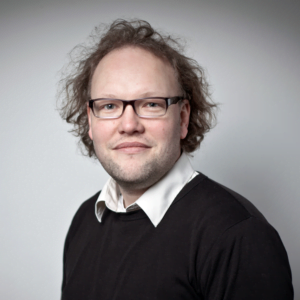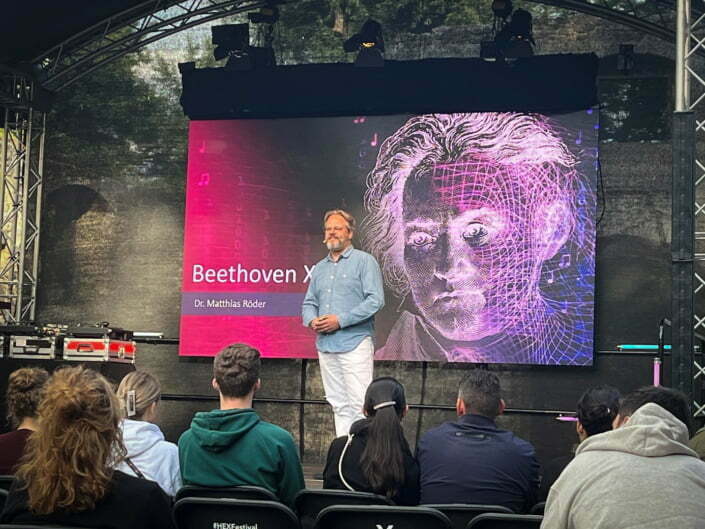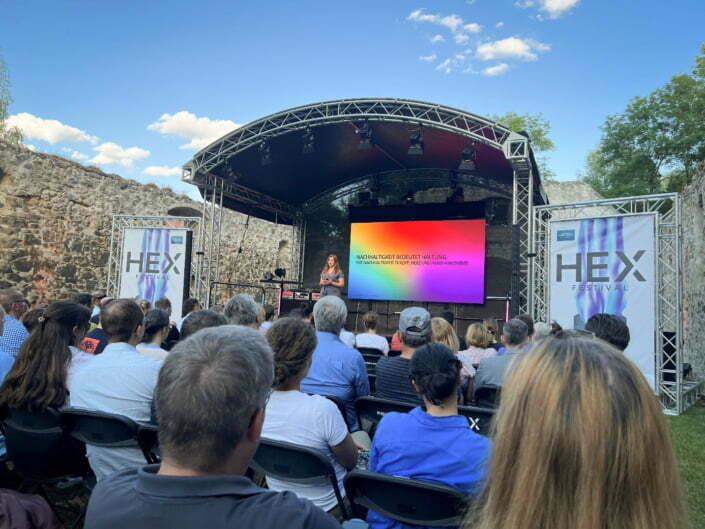HEX-Festival: Hopes and Expectations
Thursday, July 14th, 2022
From July 4 – 8, 2022, the first HEX Festival took place at the MMI Klostergarten in Riddagshausen. Well-known speakers from science, culture, medicine and the media were invited to share hopes and expectations for our future. The aim was to enter into discourse and hear suggestions for concepts. The audience could actively participate and ask questions to the experts.
Day 1: Make The World Green Again!
Tatjana Schneider, Rebecca Freitag and Prof. Dr. Niko Paech
The evening began with presentations from an ecological perspective on the state of our planet and climate change. Can we save our world and what do we have to do? Deficits were pointed out and approaches were discussed. It quickly became clear: The awareness is there, but we are not always ready to leave our own comfort zone. Or are there other approaches that could make our lives easier and at the same time more environmentally friendly? Some measures sound better on paper than the effective impact they have. The speakers agreed: sustainability is the right and only way to ensure that we will still have a world in which further generations can live in the future.
Day 2: Future of the economy = future of humanity?
Anders Indset, Stefanie Ollenburg and Lucas Buchholz
We have learned that there is also an “alternative future”. Here we are challenged. Just take different approaches and think abstractly. Or what can we learn from the indigenous Kogi people? A closed community, but not separation from the rest of the world. This Colombian people live a conscious way of life and are still connected to the modern world.
Another talk was about our buying behavior. This directly affects companies and their strategies. We can change everything. We need to become “mindful”
Day 3: Can A.I. do art?
Jovanka von Wilsdorf, Stephan Baumann, Samy Deluxe and Dr. Matthias Röder
First, the audience got an introduction to this not so new topic. The idea of artificial intelligence dates back to the 1950s. Only the affordable technology of modern times makes the resources needed for this possible. Self-learning systems can help to fill in missing documents. But in the end, humans decide. Can we even distinguish between what is man-made and what is artificial? Or do we even need a “made by human” label in the end? Music also makes use of numerous systems to support humans. But it’s not creative yet. In a few years, it may look quite different. But who wants “… beef with an A.I.?”
Day 4: Wild Wild Web
Sascha Lobo, Isabelle Ewald Catrin Schröder-Jaross and Prof. Dr. Ina Schiering
The speakers explained the Internet and its development to us. Soon the question about our behavior in the www came up. How do we contribute with our habits to train the net? In the background our behavior is analyzed (consciously or unconsciously). At the same time, however, work is being done for us. We have it in our hands to use technology, but to consider the risks in the system.
After a short development timeline of the DeepNet, a real-time journey into the DarkNet was presented. On one side unsafe marketplace for illegal and forbidden things, on the other side message exchange for persecuted people in exile.
Day 5: Science & Truth
Ranga Yogeshwar, Prof. Dr. Melanie Brinkmann and Prof. Dr. Monika Taddicken
What is science and how can it help us? Technology has made a huge leap in recent years. In medicine, the analysis of large amounts of data can make accurate diagnoses. A question for the audience: do we want to know the year we die? A quarter of the audience voted in favor. This brings the team of researchers more and more into the general focus.
But not every scientist is automatically trained for dialog in the media and on the Internet. We need to enable exchange via equitable communication channels. In school, we should no longer just learn the facts, but the system of learning. It was discussed how this teaching affects us as individuals and how the work could look like in the future.
Conclusion:
It was an exciting and very stimulating week. A great format with interesting guests who gave a direct insight into their research and projects. The festival was perfectly presented in the beautiful nature of Riddagshausen Monastery, corona-like and yet idyllic between old walls. Interactively in direct exchange with the audience, new trends but also alternative concepts were discussed. It is important to stay in communication. Next year there will be a continuation. Further information can be found on the Homepage of the HEX-Festival.

Sandro Siebke
Author
Senior Consultant

















